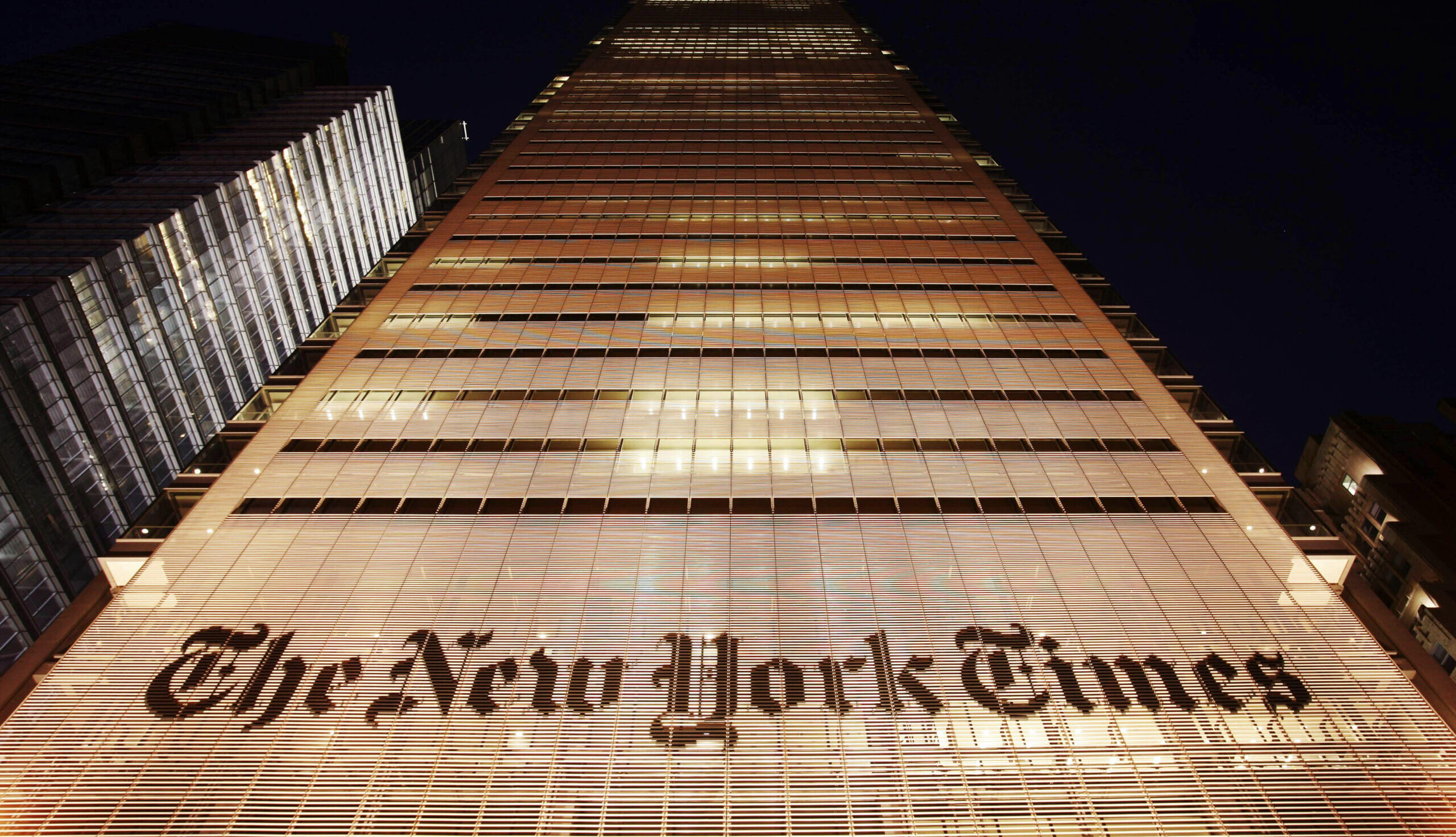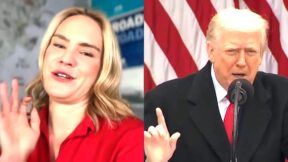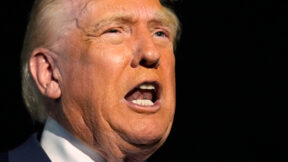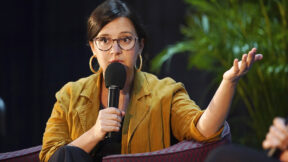Top New York Times Journalists Sign Letter Slamming Their Own Union in Row Over Trans Coverage

AP Photo/Mark Lennihan, File
Dozens of the New York Times’s most well-known journalists signed a letter Tuesday slamming the leadership of their own union for defending the paper’s writers’ right to criticize workplace conditions in relation to an ongoing row over the Times’s coverage of trans rights.
This most recent letter in what is quickly becoming a major dust-up at the Times was drafted by Times correspondent Jeremy Peters and has collected dozens of signatures from top writers like Peter Baker, Charlie Savage, Michael Grynbaum, and Kate Zernike.
Peters’s letter is addressed to NewsGuild of New York President Susan DeCarava and takes direct aim at her response to the initial set of letters criticizing the Times. “Your letter appears to suggest a fundamental misunderstanding of our responsibilities as journalists. Regretfully, our own union leadership now seems determined to undermine the ethical and professional protections that we depend on to guard the independence and integrity of our journalism,” the Peters letter says.
The whole episode began last week when two letters signed by hundreds of activists, celebrities, pro-LGBTQ NGOs, and Times contributors accused the paper of “biased coverage of transgender people” and demanded a series of reforms.
DeCarava responded to those letters, sent on behalf of groups like GLAAD and the Human Rights Campaign, by writing on the internal Times Guild listserv that “employees are protected in collectively raising concerns that conditions of their employment constitute a hostile working environment. This was the concern explicitly raised in the letter at issue here.”
“Factual, accurate journalism that is written, edited, and published in accordance with Times standards does not create a hostile workplace,” the new letter declared in response to DeCarava.
Semafor’s Max Tani reported, however, that DeCarava’s message to Times employees irked many at the paper and was seen by some as conflating the “work environment” with allegations of editorial bias.
“Criticism of workplace conditions does not include attacking the journalism of other members. I strongly object to this letter and I would hope other members of the unit agree with me,” wrote Times reporter Stephanie Saul in the union slack over the weekend, reported Tani. “Susan has no right to send out letters regarding editorial content without consulting with the membership,” Saul added.
The Times Guild replied to the Peters letter in a statement to Vanity Fair:
The Guild is committed to representing every member equally and fairly, regardless of reporting assignment. We take no position on the subject matter of editorial coverage and fight hard for every member’s right to work in a healthy and safe environment, free of harassment and discrimination. These are principles that are at the core of trade unionism and are central to our mission.
Management at the Times took issue with employees signing onto the original two letters accusing the paper of transphobia. In an email to staff, Executive Editor Joe Kahn and Opinion Editor Kathleen Kingsbury wrote, “We do not welcome, and will not tolerate, participation by Times journalists in protests organized by advocacy groups or attacks on colleagues on social media and other public forums.” They noted that “participation in such a campaign is against the letter and spirit of our ethics policy.”
As far as the Times’s editorial direction, the paper appears uncowed by the demands in the original two letters. The day after they were delivered, the Times published an op-ed from former books editor Pamela Paul titled, “In Defense of J.K. Rowling.” Paul pulled no punches in both accusing Rowling’s critics of an unjust witch hunt and declaring that demonizing her “is as dangerous as it is absurd” – she went as far as to compare Rowling’s critics to election deniers and QAnon conspiracy theorists.
Editor’s note: This article was updated to better reflect that the content of the Peters letter defended the Times coverage and criticized DeCarava for suggesting Times coverage led to a “hostile work environment.”
Read Tuesday’s full letter from Times journalists below, via Vanity Fair:
Dear Susan,
We are writing to you privately in response to your February 17th letter, which we were surprised to see.
Like you, we support the right to a non-hostile workplace where everyone is respected and supported. We believe The New York Times should never engage in biased or discriminatory practices of any kind. We all strive to be part of a truly diverse news organization where everyone is treated fairly. We welcome robust and respectful critical feedback from colleagues, either in direct conversation or through internal Times channels.
But your letter appears to suggest a fundamental misunderstanding of our responsibilities as journalists. Regretfully, our own union leadership now seems determined to undermine the ethical and professional protections that we depend on to guard the independence and integrity of our journalism.
Factual, accurate journalism that is written, edited, and published in accordance with Times standards does not create a hostile workplace.
Every day, partisan actors seek to influence, attack, or discredit our work. We accept that. But what we don’t accept is what the Guild appears to be endorsing: A workplace in which any opinion or disagreement about Times coverage can be recast as a matter of “workplace conditions.”
Our duty is to be independent. We pursue the facts wherever they may lead. We are journalists, not activists. That line should be clear.Debates over fairness and accuracy are perfectly reasonable. We understand and respect that the Guild has an absolute duty to offer representation to members when they are subject to discipline by management. But we do not think it is the role of our union to be engaged in – and taking sides in – public debates over internal editorial decisions.
Our hope is that the coming days will bring more constructive internal dialogue among Times employees and with Guild leadership that can help unify and improve our news organization. And we ask that our union work to advance, not erode, our journalistic independence.
Sincerely,
Reed Abelson
Maria Abi-Habib
Peter Baker
Emily Bazelon
Brooks Barnes
Julian Barnes
Susan Beachy
Jack Begg
Ginia Bellafante
Walt Bogdanich
Alan Blinder
Kellan Browning
Russ Buettner
David Chen
Nicholas Confessore
Rob Copeland
Reid Epstein
Elizabeth Dias
Harvey Dickson
Susan Dominus
Joe Drape
Jesse Drucker
Sydney Ember
Maureen Farrell
Matt Flegenheimer
Ellen Gabler
Trip Gabriel
Robert Gebeloff
Adam Goldman
Ruth Graham
Michael Grynbaum
Danny Hakim
Anemona Hartocollis
Virginia Hughes
Sharon LaFraniere
Joshua Katz
Clifford Krauss
Nicholas Kulish
Steven Lee Myers
Lisa Lerer
Sarah Lyall
Veronica Majerol
Jonathan Mahler
Sapna Maheshwari
Apoorva Mandavilli
Mark Mazzetti
Mike McIntire
Jennifer Medina
Phyllis Messinger
Rebecca O’Brien
Dennis Overbye
Ken Paul
Michael Paulson
Ivan Penn
Jeremy Peters
Michael Powell
William Rashbaum
Rebecca Robbins
Matthew Rosenberg
Katie Rosman
Michael Rothfeld
Jim Rutenberg
Margot Sanger-Katz
Charlie Savage
Stephanie Saul
Jennifer Schuessler
Kim Severson
Jessica Silver-Greenberg
Jeff Sommer
Nicole Sperling
Emily Steel
Katie Thomas
Marcela Valdes
Ken Vogel
Nancy Wartik
Mark Walker
Ben Weiser
Elizabeth Williamson
Michael Wilson
Michael Wines
David Yaffe-Bellany
Kate Zernike




